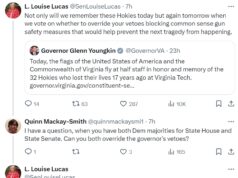The article below is my op/ed for this week in newspapers in my conservative congressional district, VA-06.
This piece appears at first to be entirely non-political. (I intersperse such pieces among my political columns, hoping to make some kind of human connection and perhaps establish a relationship outside the adversarial dynamic that makes conservatives reflexively dismissive of whatever a liberal has to say.)
But toward the end of this piece, the political dimension enters in. The political destination here is a bit more subtle than in my usual straight-on declarations about our political crisis, but it’s there.
********************
There are many reasons for my love of old movies. Not least of them is that I have a life-long interest in how things change.
Watching an old movie, I might linger (with the pause button) over a shot of the New York skyline from the 1940s, and marvel over how completely the architecture has changed, as brick and concrete have given way to vast surfaces of glass held together by metal.
Or I might feel nostalgic as I watch the cars of the late 40s and early 50s driving along some small-town street – cars from a time when each make had its distinctive shape (the curves of a Caddie, the toothy grill of a Buick, the more rectangular Ford, the pointy nose on a Studebaker).
I like remembering how the world looked when I was a boy.
Besides the photographic evidence of an era gone by, I also like to notice the changes in the story-lines, and how the characters are not like the people we see in more recent movies. And I like to think about what those changes mean.
It was back around the turn of the millennium that I began to be troubled by some of the changes I saw. There are still plenty of movies I love, but…
For me to enjoy a movie, it is important – almost a requirement – that the characters I am invited to identify with behave in a way that I respect. If possible, admire. As I’ve gotten older, I have found it less and less tolerable to have a protagonist who acts like a fool, or a jerk, or a scoundrel.
What I noticed is that I am more likely to be comfortable identifying with the protagonists of the older movies – maybe 1935-1965 — than those of the newer movies.
Another related change in the movies is a bit more subtle: even when they behaved badly, the people in the older movies always seemed to be operating in some kind of a moral framework. Even if they fell short, most of these characters seemed to have some aspiration to measure up to some ideal of how a person should be, how the world should be. (And even if the characters didn’t care about such ideals, the viewpoint of the movies themselves expressed an allegiance to an ideal.)
It seems to me that, in the movies of recent decades, the concern for any such ideals has greatly diminished. One can certainly still find movies that have that quality, but it has become rarer. I don’t think anyone these days would make It’s a Wonderful Life.
Here’s an illustration of this moral erosion: too often, the movies seem to be saying it’s OK for our heroes to do anything to achieve their goals. We as the audience are rooting for their success. But too often the movies seem to have lost the sense that there is at least a moral dilemma involved in using bad means to achieve a good end.
It was in a Batman movie that I first moment I noticed how much the moral concern that marked the culture I grew up in had vanished. Batman had subdued a bad guy from whom our hero wanted some information. They were up on a roof, maybe six stories up, and our hero held the bad guy by the feet, head down over the edge of the building, threatening to drop him to his death if he didn’t spill the beans.
The movies made in the post-War America I grew up in expressed pride in how our guys were different from the Gestapo, with their torture and brutality. I cannot imagine any of the guys with white hats I had as heroes back when I was a kid terrorizing anyone with the threat of death to extract information from someone at their mercy. That’s what the evil people did.
But this Batman movie didn’t seem the least bit troubled by Batman’s interrogation techniques.
This same indifference to the means our heroes use is shown in various spectacular car chases so many movies enact so well. True, it’s great footage, giving nail-biting excitement. But there’s a problem.
That problem is illustrated in the Bourne movies. I like those films. But really, is it OK to drive all around a major world city at break-neck speeds, sometimes going the wrong way on divided highways, leaving piles of wreckage and who knows how many injuries and fatalities in one’s wake—because the hero is determined to escape capture?
The unstated message wafting up from the movies seems to be: Do whatever gets you what you want. Don’t worry about the damage you’re doing to the world around you.
Movies help shape the culture. But in this ethic of recklessness, the movies seem even more to express a change of values that has wafted up from the culture at large. That same unprincipled “principle” is certainly visible in our politics in these times.
The outcomes of our political battles matter as much to me as to any of my fellow Americans. But I wouldn’t want my political protagonists to twist the Constitution, or trample on the well-established norms for how laws get made, just to get some sort of “victory.”
You might get where you wanted to go, but you leave too much wreckage behind.
Some years back, I was engaged in a political battle against a political outfit that specialized in lies. Some people on “my side” suggested that I should start peddling falsehoods like “the other side” does, so we could defeat them. My response was that even if that helped “us” win, the real winner would be not us, but the Lie. And it was because I wanted the spirit of the truth to prevail that I entered that battle in the first place.
Winning can be important. But, as the heroes in those old movies taught us, how one wins also matters.


 Sign up for the Blue Virginia weekly newsletter
Sign up for the Blue Virginia weekly newsletter

![Tuesday News: “Johnson gambles on plan separating Israel aid from Ukraine funds”; “It Took One Day for Trump to Get in Trouble at His First Criminal Trial”; “If [Youngkin] wanted to write bills, he should have run to serve in the General Assembly”](https://bluevirginia.us/wp-content/uploads/2024/04/trumptrial-238x178.jpg)






